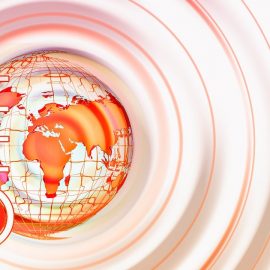
Are you prepared for the next global crisis? How has the COVID-19 pandemic changed your perspective on worldwide interconnectedness?
The book COVID-19 by Klaus Schwab and Thierry Malleret delves into how COVID-19 changed the world across various global systems. The authors explore how the crisis has exposed vulnerabilities, shifted international dynamics, and heightened risks for vulnerable nations.
Keep reading to uncover the complex web of consequences stemming from this unprecedented global emergency.
How COVID-19 Changed the World
The COVID-19 pandemic has emerged as a complex emergency, profoundly affecting systems worldwide. Its impact extends far beyond health issues, causing deep changes in economic systems, global interactions, societal structures, environmental factors, and technological progress. This global crisis has fundamentally reshaped our world, leading many to study how COVID-19 changed the world in ways that will likely persist for years to come.
1. Exposing Vulnerabilities & Exacerbating Existing Problems
The pandemic has laid bare deep-seated weaknesses across interconnected domains of our global economic system, social constructs, geopolitical landscapes, ecological setups, and technological foundations. It’s exacerbated pre-existing difficulties and vulnerabilities across different global industries, highlighting how global risks are systemic and interlinked.
Research suggests that the emergence of infectious diseases can trigger a series of events potentially leading to the breakdown of global governance structures and increased social turmoil. The outbreak has exposed the fragility of supply chains, particularly those relying on just-in-time inventory, and its impacts on areas like “high-frequency” trading. It’s also intensified pre-existing societal disparities, underscoring the stark variations in risk exposure among different social groups.
Moreover, the health crisis has revealed shortcomings in many nations’ healthcare systems, which were overwhelmed due to insufficient funding. This emphasizes the critical need for improved preparedness and delivery of health services.
2. Shifting Global Dynamics
The pandemic has accelerated the decline in global interconnectedness, reduced international cooperation, and intensified the rivalry between the United States and China. As globalization retreats, there’s an increasing push for national self-reliance. Balancing this trend requires complex decisions that reconcile the demands of advancing global economic integration, safeguarding democratic governance, and upholding the autonomy of nation-states.
This retreat from global interdependence could lead to significant outcomes, including trade and currency conflicts, social unrest, and intensified nationalism. The health crisis has also escalated the pre-existing rivalry between the U.S. and China, raising concerns about a prolonged division in economic and technological spheres.
3. Heightened Risks for Vulnerable Nations
The outbreak has intensified the vulnerability and decline of specific countries, increasing the risk of turmoil, conflicts, and extensive displacement. It’s exacerbated existing challenges in nations already struggling with adversity. Economic disturbances and conflicts could trigger migration movements on a scale similar to the 2016 European crisis.
The United Nations’ call for a global ceasefire has been largely ignored, indicating that many regions continue to be plagued by unrest and discord. This situation highlights the urgent need for creative strategies to stabilize societies and prevent the disintegration of state structures in these vulnerable countries.






